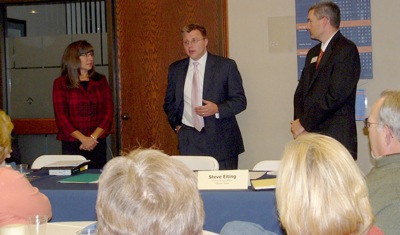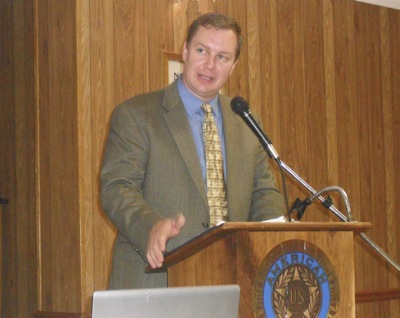Wednesday, November 17th, 2010
Experts help in planning for future
By Christine Henderson

Photo by Christine Henderson/The Daily Standard
Panelists at a recent seminar are Tami Sanford, left, certified public accountant; Craig Kennedy, certified wealth strategist; and Steve Eiting, CPA and trust officer. Joint Township District Memorial Hospital Foundation and Minster State Bank held the tax savings and estate planning session at Minster Bank, St. Marys.
ST. MARYS - Maybe just as hard as earning a nest egg are figuring how to have the revenue available when needed and giving what's left to heirs, instead of the government.
Local experts recently offered some suggestions on how to prepare financially for the future.
Joint Township District Memorial Hospital Foundation and Minster State Bank held a tax savings and estate planning seminar with panelists Kraig Noble, attorney with Noble, Montague and Moul LLC in St. Marys; Craig Kennedy, a certified wealth strategist with Asset Allocation Associates of Celina; Steve Eiting, certified public accountant and trust officer with Minster Bank; and Tami Sanford, CPA with Siefring & Associates, St. Marys.
A person's estate can entail a variety of financial resources, such as bank accounts, investment accounts, real estate, life insurance and trusts.
Some people may want their estate to go through probate court to have transfer of property/funds supervised, Noble said The court may help deal with creditors.
"Avoiding probate does not mean avoiding taxes," Kennedy added. Taxes are charged when property is transferred.
State tax of 6 percent is charged on estates over $338,000, Kennedy said. Life insurance is part of this total, unless it is in a trust, he added.
There currently is no federal estate tax, but that is scheduled to resume in 2011. U.S. Congress is still wrangling with the issue and the tax amount.
Still, many people may want to stay out of probate court, where assets are totaled for taxing purposes and records are public.
One method to avoid probate court is to set up contracts with the people/business holding one's assets, Noble said. A contract would state assets transfer at death to designees. A joint survivorship bank account will have the funds automatically go to the survivor, Noble continued. Investments, such a 401K and Individual Retirement Arrangement (IRA), will go to the beneficiary. Contract creators need to list every person to whom they want to give the assets, Noble warned.
A second method to miss probate is to set up a life estate for real estate. Property would be deeded to children/heirs with income retained until the death of the designated person, Noble said.
The life estate is sometimes used so the original landowner has reduced assets to qualify for Medicaid. Now, Medicaid looks back at assets for five years; so to qualify, the transfer must be established that long before a nursing home is needed, Noble explained.
The attorney warned the parent may have difficulty retaining the property if the heir has financial, difficulty. There also might be a capital gains' tax concern for the heir, Eiting added.
Thirdly, a person can avoid probate court for property/funds that are in a trust. The trust has a beneficiary and the assets are managed by a trustee, Noble said.
A trust should be written by a local attorney, who understands the person's circumstances, Eiting advised. The trust is then filed with probate court.
After it is established, the owner should put money into the trust accounts and transfer land ownership to the trust name, Kennedy added.
"The best advice I can give is to know the person you name as trustee and that you can trust them," Eiting said.
Eiting listed trust advantages: privacy; a trustee, who will manage the assets for someone who does not want to or can't do it; and an ability to set criteria for distribution of the money. In a second marriage, the trust property may go to the children; but the surviving spouse receives the income for life. Other criteria might be age limits or drug testing before funds are given.
"You keep control of your assets beyond the grave," Eiting said.
There are two types of trusts: revocable living trust and irrevocable living trust. The revocable trust allows the owner to pull assets out of the trust at any time. For this reason, the property and investments are still considered part of the person's assets for Medicaid purposes, Eiting added.
An irrevocable trust does not allow the trust owner to make major changes. Medicaid does not count this trust in determining a person's wealth.
Suggestions for special circumstances in estate planning:
Financial and legal professionals from the Grand Lake area offered tips for financial planning:
• Military veterans should check with the county Veterans Service Office to learn which elder care benefits are available. The Veterans Administration only counts assets from the day a person applies to determine eligibility.
• Universal life insurance policies taken out in the 1970s and 1980s should be re-evaluated because the costs may be high for current return on investment.
• Life insurance has gotten cheaper because people are living longer and companies collect premiums longer.
• A charity can be named a beneficiary. Ownership of life insurance can be transferred to a charity, gaining a tax deduction for the giver.
• If married at least 10 years, an ex-spouse qualifies for a share of one's Social Security benefits. If a person is married twice for more than 10 years each, he/she can pick which former spouse's benefit to claim.
• A prenuptial agreement is recommended for a second marriage, but with the parties consulting their own attorney to prove fairness.
• A trust or contract agreement may help a co-habitating couple.
• After a divorce, a person must enact the court settlement, such as transferring ownership of land and accounts. The beneficiary should be changed on such documents as power of attorney, health care, life insurance and pensions.
• If included, IRAs may put a trust into a corporate tax level.
• People can give gifts of $13,000 per year per person without need for a special tax return form through 2011. A form must be filed after that amount, but there is still no gift tax until $1 million.
• Through the end of this year, there is no limit on the amount that can be converted from a traditional IRA to a Roth IRA. A person may pay half the taxable converted amount in 2011 and the rest in 2012. Currently, a Roth IRA has tax paid upfront and none at withdrawal of funds. A traditional IRA has tax deferred until withdrawal of the revenue. As of this year, a person must begin getting money out of an IRA by age 701/2 or get a 50 percent penalty.
- Information is from a seminar with speakers Kraig Noble, attorney with Noble, Montague and Moul LLC in St. Marys; Craig Kennedy, a certified wealth strategist with Asset Allocation Associates of Celina; Steve Eiting, certified public accountant and trust officer with Minster Bank; and Tami Sanford, CPA with Siefring & Associates, St. Marys.



